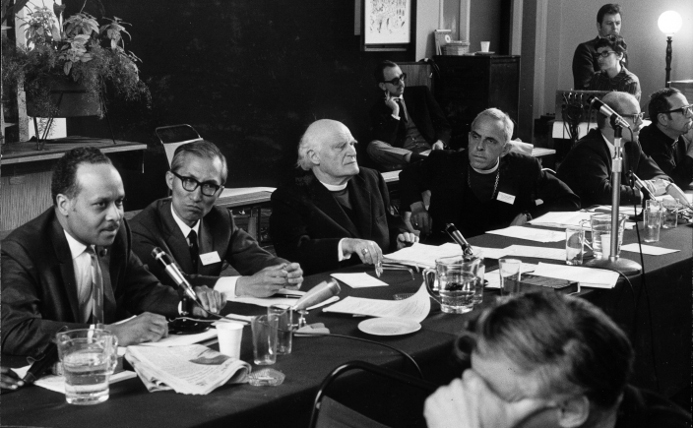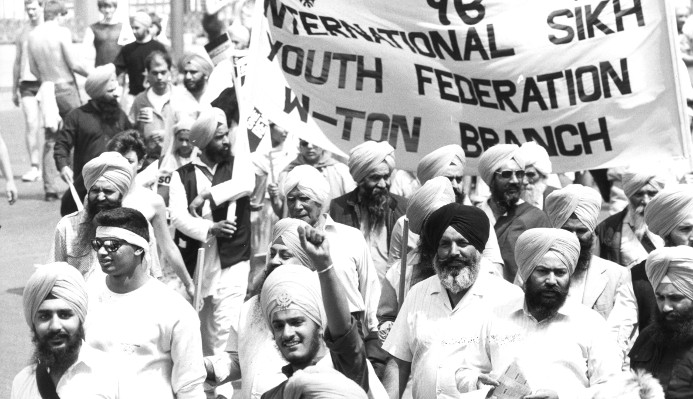MULTI-FAITH INITIATIVES
The Anti-Apartheid Movement reached out to involve people of all faiths in campaigning against apartheid. Its Multi-Faith Committee was set up at an Inter-Faith Colloquium on Apartheid organised by AAM President Trevor Huddleston in 1984. The Colloquium was attended by Buddhists, Christians, Hindus, Jews, Muslims and Sikhs. The group worked to increase awareness of the evils of apartheid among people of faith.
CHRISTIAN CHURCHES
Britain’s Christian churches had close links with their sister churches in South Africa. The attitudes of the church establishment changed in response to the emergence of church leaders like Bishop Desmond Tutu and Rev. Frank Chikane. In the 1960s and 1970s the British churches opposed arms sales to South Africa, but were critical of the call by the World Council of Churches for disinvestment. It was left to pressure groups like Christian Concern for Southern Africa (CCSA) and End Loans to Southern Africa (ELTSA) to stimulate action for economic disengagement.
In the 1980s the AAM established strong links with the British Council of Churches. It worked closely with the Catholic Institute for International Relations and the Methodist Church. The churches adopted a policy of selective sanctions. In 1989 the Church of England’s General Synod, the Methodist and Baptist churches, and all the main Scottish churches played a leading part in the Southern Africa Coalition.
REACHING OUT
From the early 1980s the AAM reached out to other faiths. The Nelson Mandela Coordinating Committee’s petition for Mandela’s release was circulated to temples and mosques and Trevor Huddleston opened the Buddhist Peace Pagoda in Battersea Park. Jews against Apartheid was formed in 1986. Local AA groups worked with local faith communities.
CAMPAIGNING ON NAMIBIA
The AAM’s Multi-Faith Committee held its first workshop in the Central Gurdwara in 1985. It distributed information about apartheid in mosques, temples, synagogues and churches. It campaigned on Namibia, working with Church Action for Namibia. The group held services at which all the world’s major religions were represented on occasions like the opening of the Commonwealth mini-summit on South Africa in August 1986 and Nelson Mandela’s 70th birthday.
 The World Council of Churches Consultation on Racism held in Notting Hill, London, 19–24 May 1969 led to the setting up of the WCC’s Programme to Combat Racism (PCR). The Programme broke new ground in giving grants for humanitarian use to the Southern African liberation movements and other anti-apartheid organisations, including the AAM. In the centre of the photograph are the Archbishop of Canterbury Michael Ramsey and Trevor Huddleston. Copyright © World Council of Churches
The World Council of Churches Consultation on Racism held in Notting Hill, London, 19–24 May 1969 led to the setting up of the WCC’s Programme to Combat Racism (PCR). The Programme broke new ground in giving grants for humanitarian use to the Southern African liberation movements and other anti-apartheid organisations, including the AAM. In the centre of the photograph are the Archbishop of Canterbury Michael Ramsey and Trevor Huddleston. Copyright © World Council of Churches

